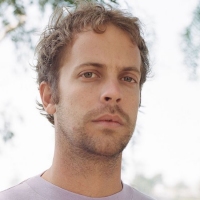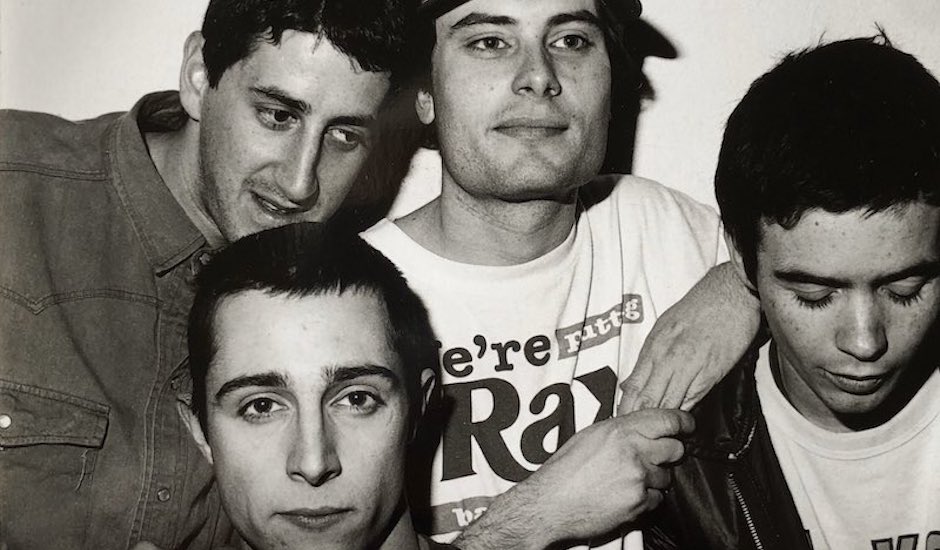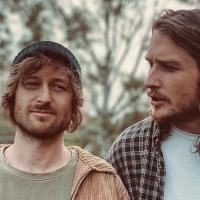 Premiere: GUM shares live take of Don't Let It Go Out, announces new albumJay Watson will share his fifth GUM record, Out In The World, on June 12th via Spinning Top Records / Caroline Australia.
Premiere: GUM shares live take of Don't Let It Go Out, announces new albumJay Watson will share his fifth GUM record, Out In The World, on June 12th via Spinning Top Records / Caroline Australia.

Learnings from The Avalanches' legendary Since I Left You, 20 years later
In the lead up to the album's 20th anniversary, it’s well worth learning a little more about that unlikely classic record.
It’s been almost twenty years since The Avalanches’ Since I Left You welcomed us to paradise.
There’s still much to be said about the kaleidoscopic record, a jet-setting romance imbued with the spirit of late-’90s dance, the flourish of mid-’70s disco and the exotic romanticism of late-’50s Sinatra. There’s little but conceit that endears it to Come Fly With Me, but that ethic is as central to the record as the thousands of samples that comprise it, the lynchpin about which a swathe of late-20th century culture is chopped, scratched, mixed, pitch-shifted and carefully placed. I’ll ease up on the poetics – gotta save something for the November anniversary.
The point is, Since I Left You launched six voracious Melbourne crate diggers to worldwide fame, leaving none more surprised than the musicians themselves. In 2001, Pitchfork wrote that Since I Left You "sounds like nothing else,” the intricate sample-fuelled collage “brimming with spontaneity, joy, sadness, humour, reflection, and general human-ness.” Those qualities saw it named the tenth-best record of the 2000s in their curiously front-loaded retrospective, but even with this global recognition, The Avalanches seem a dark horse of Australian music. Their distinct lack of drawl or diction renders them all but stateless, and they’re hardly invoked in those classic Australian best-of discussions – at least, not in the ones I’m having.
It’s fortunate, then, that The Avalanches – now a duo – took some time out of their prompt and uncharacteristically fruitful recording sessions to reminisce about their 2000 debut as a part of #TimsTwitterListeningParty. Hosted by singer-songwriter, author and label head Tim Burgess, the parties allow artists and appreciators to “listen to albums together, apart,” threading their thoughts and sharing insights on the making of, and reception to, their art. It’s a uniquely modern means to a shared experience, but necessity is the mother of invention, and at this point, I’ll take whatever social interaction I can get.
The two remaining members of The Avalanches, Tony Di Blasi and Robbie Chater, had a whole lot to say about their indelible debut. Here’s a handful of their interesting observations, asides and admissions:
It’s As Impenetrable As Ever
There’s really no knowing just how sonically dense Since I Left You truly is. Estimates of the number of samples range from 900 – a number invoked by Billboard, who credited the six-month delay to acquiring clearances, and Pitchfork, who claimed it was “built from over 900 samples” – to a more extreme 3,500, put forward by The Guardian, Complex and Robbie Chater himself. There’s a good chance we’d never know, even if there were a record: it’s unlikely every single sample was cleared, and each uncleared admission can quickly become a legal liability.
That fear seems to have faded a little, and on Sunday, Chater and Di Blasi let slip a few of their more esoteric sources. A sly Instagram story mentioned a 1958 record by one Charles K.L. Davis, a prodigiously talented, operatically-trained Hawaiian singer who studied at Julliard, performed at The White House and toured to Moscow with Ed Sullivan. The record in question, Ray Kinney Presents Charles K.L. Davis At The Royal Hawaiian, was his first, and the orchestral opening of album closer Younger Than Springtime immediately calls to mind the swelling strings that kickstart Since I Left You. It’s not that it was a hard flip to identify – it’s just that nobody knew where to look.
If that was too easy a find, the source of the iconic “Massachusetts Institute of Technology” interlude from ETOH is truly surprising. The band claim it’s a fragment from Gray Line Sound Tour of Historic Boston, a local spoken word record released by the bus company of the same name, and whilst there’s no reason to doubt them, it’s currently impossible to verify. There’s absolutely no online record of the album: we’re not talking a lack of YouTube rips or downloadable .zips, we’re talking no mention of the record in any available catalogue, archive or library. Granted, it’s a good admission – you can’t get sued over a record that, for all intents and purposes, doesn’t even exist.
ETOH - heres the whodini record I used #TimsTwitterListeningParty #sinceileftyou pic.twitter.com/4PFyHYP8JF
— The Avalanches (@TheAvalanches) April 25, 2020
If that represents the pinnacle of the group’s obscure tastes, then the famed flip on Stay Another Season is testament to their gall. It’s no secret that the underlying sample comes courtesy of Madonna, and whilst her blessing was integral in acquiring clearance, Tony admitted that the source was a little less direct than you’d think.
The use of Holiday might be the most outright identifiable flip on the record, but the pair actually pulled the instrumental from MC Miker G and DJ Sven’s Holiday Rap, an unironically great 1986 Dutch novelty song. That track didn’t even sample Madonna’s original hit – instead, producer Ben Liebrand re-recorded the track using the very same instruments. Tony believes Stay Another Season was the first sample the Queen of Pop officially cleared, a feat he credits to XL Recordings’ Richard Russell. That may well be true: Madonna was sampled and interpolated prolifically throughout the ‘80s and ‘90s, but whether she actively approved of those appearances is another question entirely.


"Steve Gullick photoshoot - 2000."
A Note On Recurring Characters
That Holiday Rap instrumental was too good to waste, and the bassline quietly reappears in the middle of Little Journey, one of the last songs the group cut for the record. “Robbie had put it together really quickly,” recalled Tony, “just a beautiful example of pure creative expression.” It’s intricate details such as these that subtly interlink the many-splendored songs, and as Robbie and Tony recall, Madonna is far from the album’s only recurring cameo.
The group confirmed that experimental stalwart Laurie Anderson appeared on Radio, her casual voice rendered in clipped loops. The phrase “sending those signals, those digital signals” creates a propulsive rhythm that runs throughout the track, but the statement itself is far from musical. The Avalanches sourced it from 1986’s The Interview From the Film Soundtrack to Home of the Brave, a promotional record issued ahead of her self-directed concert film of the same name.
Anderson also appeared on Frontier Psychiatrist, with a phrase from that same 1986 interview delivering one of the track’s most striking non-sequiturs: “a violin.” Laurie mightn’t have been a member of the six-man outfit, but she did feature on two of the album’s four singles, and that has to count towards some kind of honorary status.
Lost In The Mix
It’s hardly surprising that a record such as Since I Left You went through a swathe of changes, alterations and tweaks before finally being released. If those alterations were largely in pursuit of cleanliness and quality, some changes were sacrificial, such as those that shaped Live At Dominoes.
LIVE AT DOMINOES - the demo of this was absolutely mind bending , but we could never get it to sound as good once we took it into the proper studio to mix. You can hear the influence of the Roule and Crydamoure labels here. #sinceileftyou #TimsTwitterListeningParty
— The Avalanches (@TheAvalanches) April 25, 2020
There’s still a fondness for the cut, which features a rare appearance of an Avalanches member on the mic. “Rob got me around to try and get a top line for this banging song he had,” explained Tony to the listening party. “I sang some stuff, he cut it up and got me sounding half decent.”
It’s not a listening party revelation, but lost too was the Rodgers and Hammerstein sample that originally opened the record with “harps playing and girls singing.” That clearance issue didn’t get them down and, sixteen years later, Chater and Di Blasi returned with Frankie Sinatra, which prominently features – you guessed it – a sample of Rodgers and Hammerstein’s Sound of Music classic, My Favourite Things. The Avalanches always get their man.


"Robbie at work, 2000."
Frontier Psychiatrist Is Still Wild
Do you remember the first time you heard Frontier Psychiatrist? I think I might have been too young to really register the sheer eccentricity of the song, but my memory of the music video – beamed into my brain via Rage, the root of many a childhood nightmare – refuses to fade. The blend of bizarre imagery and leftfield audio left a real impression, and whilst six-year-old me was uninitiated to almost everything, even The Avalanches themselves were stunned by the joint.
“We’d all been out for dinner and came back to Robbie’s and he played us this,” wrote Tony. “This was when I knew this record could be something special. It was really mind-blowing hearing it for the first time.” That moment of mind-blowing complexity was a long time coming, and as Robbie tells it, he and former Avalanches member Darren Seltmann toiled away as a duo.
“I’d had the bombastic Enoch Light spaghetti western kinda loop for years, and was always trying to turn it into like a super banging hip hop tune, but it just wasn’t going anywhere… one day I came across the Wayne and Shuster comedy album and a little lightbulb went off in my head… I’d combine it with the spaghetti western sample and make a surreal scratch / comedy song… I had a huge collection of spoken word and comedy albums, golf instruction albums, bizarre Christian albums… the guys were always like, why are you keeping all that junk! I invited Dexter over and we went through them all and completed the idea & the rest is history.”
All work and no play? Not quite.
I loved adding the horse sample to complete the track.. we went to the video store, hired a heap of western movies on vhs , got stoned and sampled away.. #TimsTwitterListeningParty
— The Avalanches (@TheAvalanches) April 25, 2020
Tonight May Have To Last…
“This was really late in the process, although I’d had the piano sample for years,” said Chater of melancholic slowburner Tonight May Have To Last Me All My Life. “I recorded it with my hand on the turntable and it warped like that as I sampled it into the AKAI s9000.”
Chater’s finesse with the turntable made for an intoxicating piano loop, but it also may have helped obscure its origins. “I lost the record on tour with Public Enemy in like ‘97 and to this day don’t know what it was from,” he admitted, “all I had left was the floppy disk labelled ‘sad piano’.” It’s a pretty good descriptor, to be sure, but the mystery of the ‘sad piano’ endures more than two decades after the fact.
.. years later while finishing the album I added the beautiful Nancy Wilson vocal sample .. I loved how simple the song was, like a pause, a chance to catch your breath on such a dense album .
— The Avalanches (@TheAvalanches) April 25, 2020
- ROBBIE #TimsTwitterListeningParty #sinceileftyou
It’s a flip made all the more prominent by Mac Miller’s Aliens Fighting Robots, a Macadelic cut built atop Robbie’s turntable-tweaked piano. Unsurprisingly, that wasn’t lost on either of the hip-hop heads: “when Mac Miller sampled it we were really moved.”
Avalanche Above, Business Continues Below
That’s just the tip of the iceberg. It’s only right that an intrepid travelogue such as Since I Left You should have stories on stories, and over the course of the listening party, The Avalanches offered recollections on the making of Electricity (“one where the four of us sat around and made it together”), A Different Feeling (“our psychedelic take on some of the house records that were coming out of France at the time”), Diners Only (“a nod to Beastie Boys and Get It Together”) and Since I Left You (“we’d just got back from playing basketball in the park with Cut Copy… and popped to see what he was up to. He had a song going but didn’t want to play it to us…”).
They’re deceptively deep insights into an unconventional process, recollections coloured by the success that ensued. The Avalanches didn’t expect their record to ignite imaginations, a wild testament to the power of modesty – these memories were made as the group maintained “a 'no-one's going to listen to it anyway' sort of attitude,” and the very existence of clamouring fans must seem surreal.
There’s never a bad time to revisit Since I Left You, but it might just be a particularly good one. Throw on the title track, sink back to the turn of the century and float through an anachronistic dream, learning a little about the Australian masterpiece from those responsible. We could all use a quick getaway right now, and though that might be all but impossible, Since I Left You is more than the next best thing – it’s a stop-by-stop sonic itinerary. There’s only one thing left to do.
“Get a drink, have a good time now, welcome to paradise…”
Follow The Avalanches: FACEBOOK
 Premiere: GUM shares live take of Don't Let It Go Out, announces new albumJay Watson will share his fifth GUM record, Out In The World, on June 12th via Spinning Top Records / Caroline Australia.
Premiere: GUM shares live take of Don't Let It Go Out, announces new albumJay Watson will share his fifth GUM record, Out In The World, on June 12th via Spinning Top Records / Caroline Australia.
 Premiere: Hayden Calnin and Harrison Storm unite for new single, Unfortunate LoveOn their new collaborative single, two of Australian indie's best highlight each other's strengths.
Premiere: Hayden Calnin and Harrison Storm unite for new single, Unfortunate LoveOn their new collaborative single, two of Australian indie's best highlight each other's strengths.